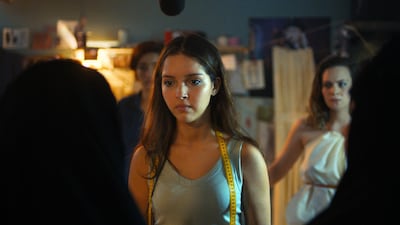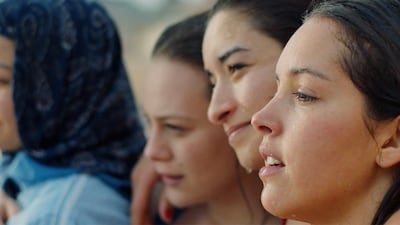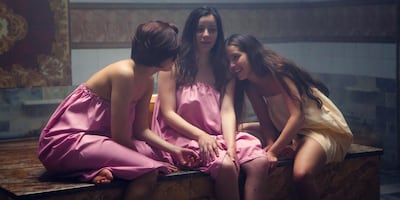Algerian filmmaker Mounia Meddour is sitting in a cafe in Cannes across the road from the world-famous red carpet. I'm expecting the writer / director to be nervous, as it's only a couple of days before her first narrative feature film, Papicha, is screened in Cannes. But as we sit talking about the drama, I'm struck by how completely unfazed she is.
Perhaps her confidence comes from having already exceeded expectations just by being selected for Cannes, where she is competing for the Un Certain Regard prize, of which Lebanese director Nadine Labaki is presiding over the jury.
Why it took so long to come together
Set in Algeria in the 1990s, Papicha tells the story of Nedjma, an 18-year-old student who loves fashion and going out with her girlfriends. This lifestyle is challenged by a growing campaign for women to wear the burqa. Her life changes after a dramatic attack and Nedjma decides to create a fashion show as a symbol of resistance.
It's a film that Meddour has been trying to make for five years, but was hindered by financing difficulties. "There was not much appetite for a feminist film set and shot in Algeria. The plus side is that gave me time to work on the script and nourish the details," she says.
Judging by the results, it was time well spent. Meddour has made a deeply complex film about sisterhood. It's set against the backdrop of the Algerian civil war, starting in 1991, which saw conflicts between the Algerian government and different armed groups. By the time it was over, there were more than 150,000 dead, thousands exiled and one million displaced. These years have become known in some circles as the "black decade".
Drawing inspiration from her own experiences
Meddour reveals that the film is semi-autobiographical. "I grew up in Algeria and lived there until I was 18," she says. "I studied and lived at the City University just like the dormitory in the film and so there is a lot of truth and details that we see in Papicha that are from my memories of that time."

While it's also true that fundamentalist views were on the rise while she was studying, there were aspects that were embellished. "The terrorist attack on the university campus was a plot device," she says. "A lot has to be made up to fit the formula and structure of a movie and give it a climax."
The first half of Papicha builds up the relationships that Nedjma has with her friends. They are an amazing gang. Her friends include the sentimental Wassila, Kahina, who dreams of going to Canada because Celine Dion and Roch Vossine are big stars there, and Samira, the most religious of them all, who encourages Nedjma to put on the fashion show that gives the film its thread. "I wanted to create a complex panorama of characters," says the director.
It's not just the attitudes of the characters that make them targets, but also the professions they choose to pursue. It's another plot element where art imitates life. Meddour's family left Algeria and moved to France after death threats were made against her parents because her father is a filmmaker. In Paris she signed up to study journalism and took a summer course on the directing programme at La Femis, the famous film school.
The connection between past and present
"I began making documentaries about my big interest, which is the position of women in Maghrib societies," says Meddour. "I'm interested especially in the interaction between women and the public space." This interest is apparent in Papicha, where the exterior world is masculine and the interior feminine. "The fashion show was important because it was important to show a masculine side to life and a feminine side. It was masculine in the city and in public spaces."
The director also used skills picked up while making documentaries to use on the shoot, “Some of the scenes we shot were done on the fly. They were not part of the script but something would happen and I would mix the reality of what we were witnessing with the fiction of the story.”
The film has the handheld close-up aesthetic like that which has come to be associated with two-time Palme d’Or winners, the Dardenne Brothers. Other influences are the social realist British director Ken Loach and French auteur Jacques Audiard.
When I say that the film can be interpreted as a battle between tradition and modernity, Meddour shakes her head: “I don’t think it’s a film about modernity against tradition. Nedjma takes the ‘Haik’ which is an old traditional garment worn by women in the home and she takes this garment and starts a design collection. She is taking tradition and applying it for the future. It’s not a contradiction. They are complimentary to each other.”
And it’s this connection between past and present and the amazing fashion that Meddour hopes will catch Labaki’s eye during the festival.
Papicha screens at the Cannes Film Festival on May 21



